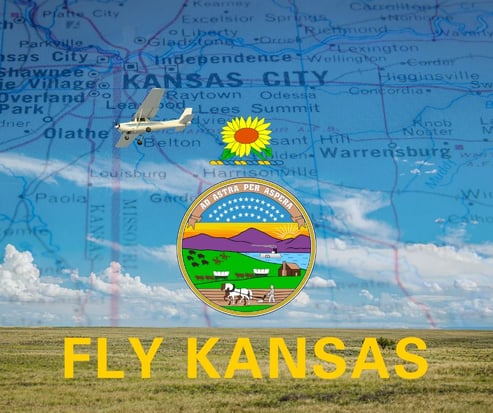Kansas, Heartland of Aviation
The allure of Kansas City's rich aviation culture have established the region as a hub of aerospace innovation and training and it's midwestern location make it very affordable. Whether you're taking off from the bustling airports of Kansas City or soaring over the expansive wheat fields of Kansas, the region is a great place to become a pilot. Combining the urban charm of Kansas City with the vast landscapes of Kansas, aspiring pilots are have a versatile environment for flight training. Let's dive into why this region stands out and what makes it a common destination for pilots.
Institutions like Flex Air play a pivotal role in weaving this legacy, offering top-notch training to novices and experienced pilots alike, with a focus on guiding veterans, especially those from nearby Fort Riley, into commercial aviation careers. Here, pilots not only connect with aviation history but also acquire diverse skills tailored to the unique challenges of the Midwest.
10 Things You'll Learn from Flight Training in Kansas and Kansas City
 Wide Open Space Navigation
Wide Open Space Navigation
With vast landscapes, pilots learn to rely on fewer visible landmarks, blending old-school techniques like dead reckoning with modern GPS systems.
- Tip: Regularly practice visual flights over the plains, alternating between traditional and digital navigation aids.
Uncontrolled Airspace
A significant portion of Kansas airspace is uncontrolled, offering an excellent opportunity for pilots to practice maneuvers without the constant supervision of air traffic control.
- Tip: Utilize the vast uncontrolled spaces to perfect your maneuvers. The consistent grid of farmland section lines can be a useful aid in visual navigation.
Midwest Weather Mastery
Being part of Tornado Alley, pilots must decode the intricacies of Midwestern weather, ranging from sudden thunderstorms to wind shears, ensuring safety and adaptability.
- Tip: Invest time in meteorology courses and use Kansas's variable weather to regularly practice adjusting flight plans in real-time.
Varied Airstrip Operations
Kansas City's urban airports and Kansas's grass and remote airstrips provide pilots with a spectrum of operational experiences. Mastery over different runway types boosts versatility.
- Tip: Designate specific training days for each type of airstrip to get comfortable with varied takeoff and landing requirements.
Crosswind Challenges
The region's wide-open spaces often lead to pronounced crosswinds. Mastering crosswind takeoffs and landings becomes pivotal for a pilot's skill set.
- Tip: Learn from experienced instructors and use wind tunnel simulations in addition to field practice to refine techniques.
Deep Dive into Aviation History
Kansas's rich aviation history offers lessons from the past, while Kansas City's museums and sites enrich the learning experience.
- Tip: Attend workshops, seminars, or lectures hosted by local aviation historians to gather insights and anecdotes.
Many Towered Airfields
Kansas City offers many towered Airfields which offer chances to practice talking to many different ATC and to practice many different approaches.
- Tip: Visit lots of different towered airports to shoot as many approaches as possible
Central US Navigation
Kansas's central location is a springboard for cross-country flights, teaching strategic planning for diverse routes across the U.S.
- Tip: Map out and undertake cross-country exercises to practice efficient fuel usage, pit stops, and navigation.
Embracing the Flight Community
From Kansas City's thriving aviation network to Kansas's close-knit community, pilots learn the value of connections, networking, and mutual support.
- Tip: Join local aviation clubs and attend fly-ins, seminars, and airshows to foster connections and gain from shared experiences.
Advanced Emergency Training
Due to Kansas's diverse terrain and weather conditions, pilots receive robust training in emergency procedures, ensuring they're equipped for unexpected scenarios.
- Tip: Engage in mock emergency drills and invest in specialized courses that provide training for different terrains and conditions.
The integrated offerings of Kansas City and Kansas provide a comprehensive, rigorous, and diverse flight training experience. The depth and breadth of learning in this region are unmatched, making it a top destination for budding pilots.
Ready to start your Kansas pilot training?
Flex Air can help you get you private pilot's license or become a commercial airline pilot. If you have an FAA Commercial Rotor Certificate, we offer a rotor transition program. We offer a SkillBridge program for active duty service members, and we can help you with the GI Bill and VR&E benefits.

